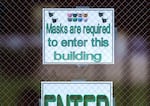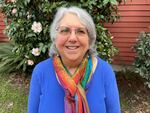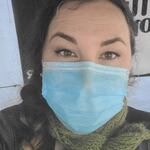Oregon and Washington’s indoor mask mandates ended at 11:59 p.m. on Friday, March 11. This means people with compromised immune systems have to rethink the extent to which they feel safe venturing out in public.
According to the Journal of the American Medical Association, close to 3% of U.S. adults were taking immunosuppressive drugs before the pandemic — that’s at least 7 million Americans. Millions more have diseases that compromise their immune systems.

Signs remind visitors that masks are required at Prescott Elementary school, Feb. 8, 2022. Masks will be optional at schools across Oregon starting March 14, the Monday after the end of the statewide indoor mask mandate.
Kristyna Wentz-Graff / OPB
OPB’s “Think Out Loud®” spoke to three Oregonians who are immunocompromised about how they’re feeling as we enter a new phase of the COVID-19 pandemic.
Martha Decherd had a kidney transplant 14 years ago and, as a result, she takes medication that suppresses her immune system. She said she’s very concerned about contracting COVID-19.
“My understanding is that it means that I would be very much at risk certainly for serious infection, if not death,” she explained. “And therefore I have been extremely cautious. I go almost nowhere and when I do, I wear a mask.”

Martha Decherd, pictured, is a kidney transplant recipient.
Courtesy of Martha Decherd
Decherd is retired and says she’s opted out of many in-person activities she used to enjoy such as taking classes or doing volunteer work. She also hasn’t seen her mother or her children and grandchildren, all of whom live outside of Oregon, since 2019.
Jake Tatel, a Hodgkin’s lymphoma survivor, works from home doing sales and marketing. He says he and his wife will go back to having their groceries delivered or doing curbside pickup, rather than shopping among unmasked people. Visiting family is also a challenge for Tatel.
“Last time one of my sons came to town, he had to go to a hotel for 10 days before he could come see me for four days,” he said. “It’s pretty extreme.”

Jake Tatel, pictured, is a cancer survivor.
Courtesy of Jake Tatel
Jessica Da Silva isn’t able to stay away from people as much as she might like. She has Lupus and other autoimmune diseases. She is also the mother of two young children and runs her own small bakery business, selling what she makes at farmers’ markets around the Portland area.
“I’m constantly out there with people coming towards me or near me and stuff. So, I have been exposed,” she said. “I have had many COVID tests, especially before the mask mandates were initiated.”
Decherd says she’s frustrated by the decision to lift the statewide mask mandate at this point in the pandemic. And she wishes people would be more understanding about her choice to avoid large gatherings.
“What I have encountered is people questioning why I’m not willing to be out in the world more,” she said.
Da Silva added that since the end of the outdoor mask mandate, she’s encountered some hostility at farmers’ markets where she sells her baked goods.

Jessica Da Silva has Lupus and other autoimmune diseases. She intends to keep wearing her mask in public even as Oregon's indoor mask mandate comes to an end.
courtesy of Jessica Da Silva
“People will make it super political or will get into your face and say, ‘I’m not buying things from you because of your mask,’” she said. “I’m going to stand my ground and wear my mask and keep my distance like I always have been for the past few years.”
As the mother of a first-grader, Da Silva is particularly concerned about masks becoming optional in schools starting March 14.
“I wish that we were keeping the masks in school until the end of the year to see how the numbers go,” she said. “There’s still vulnerable groups including me ... and the little kids that cannot even get a vaccination. So, it’s kind of scary.”
Tatel says that since vaccination rates seem to have plateaued short of herd immunity, he’s hoping for more effective treatments for COVID-19 that could be on the horizon.
“The question becomes how effective are those type of therapeutics on folks like ourselves, who are extremely compromised,” he said.
Decherd is also hopeful about therapeutics, and she said she wants people with intact immune systems to respect her choice to continue taking extra precautions during this next phase of the pandemic.
“I want people to understand that those of us who are still isolating, still wearing masks, aren’t doing it as a political statement, but as a way of keeping ourselves healthy, and that our lives are valuable, that we contribute to society, even if we’re immunocompromised,” she said.
